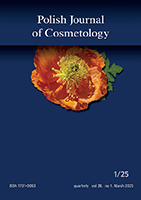search by
Copyright @ Pol J CosmetolEvaluation of the expression of CCND1 and p21 genes in normal and keloid fibroblsts treated with ellagic acidAgnieszka Garncarczyk Zakład Kosmetologii Katedry Kosmetologii, Wydział Nauk Farmaceutycznych, Śląski Uniwersytet Medyczny w Katowicach Summary Introduction. Ellagic acid (EA) is a naturally occurring polyphenol present in high concentration in fruits and nuts. EA has anticancer, chemopreventive and radical scavenge properties. Keloids are benign dermal fibroproliferative tumors with no malignant potential. They are result of altered wound healing with excessive scar tissue formation which extends beyond the area of the initial wound and does not regress spontaneously. The cyclin D1 proto-oncogene is an important regulator of G1 to S-phase of the cell cycle transition in numerous cell types. The overexpression of cyclin D1 gene - CCND1 is one of the most commonly observed alterations in human cancer cell lines. P21 is an inhibitor of cyclin-dependent protein kinases that are required for the cell with DNA mutations to enter the DNA synthesis phase (S-phase of cell cycle). Material and methods. In the present study we quantificated the viability of normal and keloid fibroblasts incubated in standard condition, treated with ellagic acid in 0.0001%, 0.0003%, 0.001%, 0.003%, 0.01% concentration for 72 h. Additionally we evaluated changes of CCND1 and P21 gene expression in normal and keloid fibroblasts treated with various concentrations of ellagic acid using novel real-time quantitative QRT-PCR (TaqMan) technique. β-Actin mRNA level was used as the endogenous reference. Results. Results of this study indicated that ellagic acid in 0.001% concentration induced P21 gene expression. In response to 0.0001-0.003% ellagic acid after 72 hours incubation KEL FIB exhibited significantly lower expression of CCND1 gene than unstimulated cells (p<0.05; ANOVA). Therefore the proapoptotic activity of ellagic acid in keloid fibroblasts could be explained by the induce changes of CCND1 gene expression. Conclusion. The results of this study show that ellagic acid modulates P21 and CCND1 genes expression in normal and keloid fibroblasts in a way dependent on its concentration. Further studies on the influence of ellagic acid on the expression of genes encoding the cell cycle in neoplastic cells may be the basis for confirming the advisability of ellagic acid supplementation as a method complementary to keloid therapy. Key words: keloid, ellagic acid, fibroblast, P21, CCND1 |




